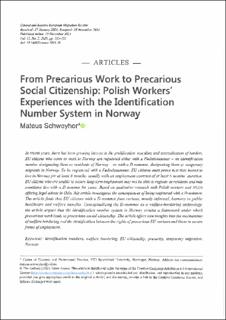| dc.contributor.author | Schweyher, Mateus | |
| dc.date.accessioned | 2024-01-03T07:28:54Z | |
| dc.date.available | 2024-01-03T07:28:54Z | |
| dc.date.created | 2023-12-19T12:38:27Z | |
| dc.date.issued | 2023 | |
| dc.identifier.citation | Central and Eastern European Migration Review. 2023, 12 (2), 135–152 | en_US |
| dc.identifier.issn | 2300-1682 | |
| dc.identifier.uri | https://hdl.handle.net/11250/3109439 | |
| dc.description | This article is distributed under the terms of the Creative Commons Attribution 4.0 International License (http://creativecommons.org/licenses/by/4.0/), which permits unrestricted use, distribution, and reproduction in any medium, provided you give appropriate credit to the original author(s) and the source, provide a link to the Creative Commons license, and indicate if changes were made. | en_US |
| dc.description.abstract | In recent years, there has been growing interest in the proliferation, rescaling and internalisation of borders. EU citizens who come to work in Norway are registered either with a Fødselsnummer – an identification number designating them as residents of Norway – or with a D-nummer, designating them as temporary migrants in Norway. To be registered with a Fødselsnummer, EU citizens must prove that they intend to live in Norway for at least 6 months, usually with an employment contract of at least 6 months’ duration. EU citizens who are unable to secure long-term employment may not be able to register as residents and may sometimes live with a D-nummer for years. Based on qualitative research with Polish workers and NGOs offering legal advice in Oslo, this article investigates the consequences of being registered with a D-nummer. The article finds that EU citizens with a D-nummer face various, mostly informal, barriers to public healthcare and welfare benefits. Conceptualising the D-nummer as a welfare-bordering technology, the article argues that the identification number system in Norway creates a framework under which precarious work leads to precarious social citizenship. The article offers new insights into the mechanisms of welfare bordering and the stratification between the rights of precarious EU workers and those in secure forms of employment. | en_US |
| dc.language.iso | eng | en_US |
| dc.publisher | Uniwersytet Warszawski, Ośrodek Badań nad Migracjami, Polska Akademia Nauk | en_US |
| dc.rights | Navngivelse 4.0 Internasjonal | * |
| dc.rights.uri | http://creativecommons.org/licenses/by/4.0/deed.no | * |
| dc.subject | Norway | en_US |
| dc.subject | temporary migration | en_US |
| dc.subject | precarity | en_US |
| dc.subject | EU citizenship | en_US |
| dc.subject | welfare bordering | en_US |
| dc.subject | identification numbers | en_US |
| dc.title | From precarious work to precarious social citizenship: Polish workers’ experiences with the identification number system in Norway | en_US |
| dc.type | Peer reviewed | en_US |
| dc.type | Journal article | en_US |
| dc.description.version | publishedVersion | en_US |
| dc.rights.holder | © The Author(s) 2023 | en_US |
| dc.source.pagenumber | 135–152 | en_US |
| dc.source.volume | 12 | en_US |
| dc.source.journal | Central and Eastern European Migration Review | en_US |
| dc.source.issue | 2 | en_US |
| dc.identifier.doi | 10.54667/ceemr.2023.26 | |
| dc.identifier.cristin | 2215536 | |
| cristin.ispublished | true | |
| cristin.fulltext | original | |
| cristin.qualitycode | 1 | |

